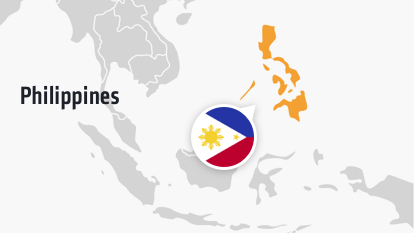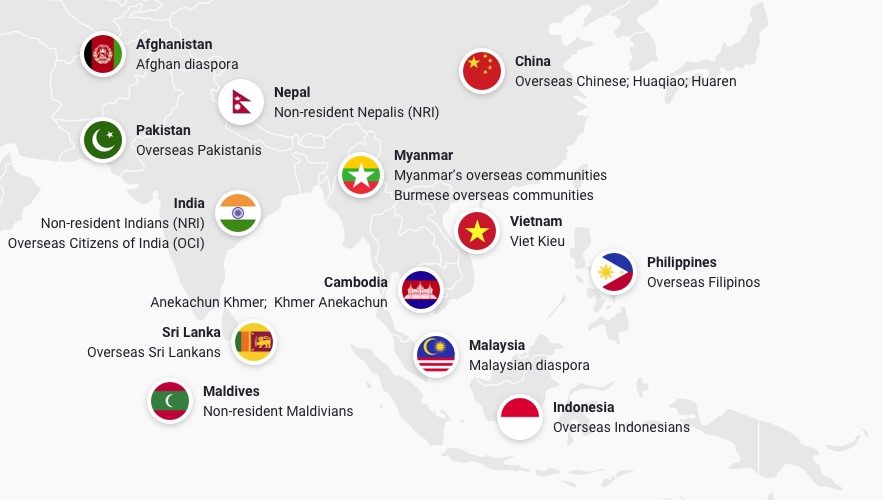Asia
This page provides an overview of diaspora engagement in the Asia region. It draws on knowledge gathered during the mapping of 16 countries to study relevant policy and institutional frameworks, trends, good practices and recommendations at regional level. A long-form version of the Asia regional overview is available to download.
There is currently no regional framework on diaspora engagement in Asia. There are, however, a few sub-regional frameworks focusing on facilitating safe and orderly labour migration and protecting migrant workers’ rights, including the Association of Southeast Asian Nations (ASEAN) and the South Asian Association for Regional Cooperation (SAARC). The relevant political dialogues include the Colombo Process, the Budapest Process and the Abu Dhabi Dialogue.
International labour mobility has played a key role in modelling the socioeconomic landscape of East Asian economies. Given that many ASEAN countries are facing skilled labour shortages, policies to engage with labour migrants and boost skills circulation are essential. Although countries in Asia have prioritised facilitating labour migration, diaspora engagement for development is gradually emerging as a national priority across Asia, albeit unevenly.
Nepal was the first in the region to adopt a diaspora engagement policy. it includes legal provisions to motivate non-resident Nepalese to take part in the development of Nepal.
Made it one of the first countries in the region to ensure that labour migration is integrated and mainstreamed in national development.
Consequently it worked to strengthen the regulatory framework, eventually leading to the 2014-18 Policy on Labour Migration.
The plan emphasises the importance of establishing skills recognition systems, promoting effective use of migrant remittances for investment at the level of the household, community development and initiating engagement with the diaspora communities to contribute to national development objectives.
Although never endorsed, the Afghan Government is working on developing a Comprehensive Migration Policy (CMP) which includes efforts to maximise the development potential of migration. In parallel it is working on the new Afghan National Diaspora Engagement Policy for Advancement of Afghanistan.
The plan has eight priority areas: recruitment process and related financial costs, social costs, skills development, social protection and rights, irregular migration and human trafficking, remittances, diaspora engagement, and climate migration.

Successive governments of Bangladesh have gradually realised the importance of its migrant communities. In 2001, Bangladesh created a dedicated migration ministry: Ministry of Expatriates’ Welfare and Overseas Employment; banks provide financial incentives to the diaspora and migrants and stipends are provided to children of migrants for academic success.

China focuses on the economic and cultural dimensions of its diaspora and has been successful in attracting overseas Chinese capital, technology and talent for national development. There is an integrated set of institutional mechanisms from the central to the local level facilitated by consular services in embassies, and a variety of universities and research institutes providing policy advice and training.

India is one of the few countries in the region to have broadened its understanding of diaspora engagement beyond labour migration. The government has increasingly understood the potential of the diaspora as investors and entrepreneurs and launched specific campaigns to attract its diaspora for this purpose. India now has one of the most comprehensive state-level diaspora engagement policies, which makes India’s institutional practices particularly interesting to observe.

Nepal was the first country in the region to adopt a diaspora engagement policy. The enabling environment for the diaspora has allowed initiatives like the Non-Resident Nepali Association (NRNA) the Brain Gain Centre to grow and facilitate diaspora contributions that catalyse economic and social transformation in Nepal. Nepal also plays an active role in the regional labour migration processes in order to advocate for migrant workers and in doing so build trust in the destination countries.

As early as in the 1970s, the Philippines created dedicated structures and programmes to facilitate overseas employment for Filipinos. Since 2001, the Government has made it a major policy not only to facilitate, but also to encourage Filipinos to go abroad for work, and aspires to encourage their investment and contribution back home. The Philippines demonstrates how reintegration strategies can be effective when migration is an integral part of the national development strategy.
The concept of ‘diaspora’ is not used consistently in Asia, and the word itself is rare in policy documents.

Asian states need to know their diaspora in order to be able to propose adequate opportunities for engagement. Data collection exercises, such as diaspora mapping and profiling of the diaspora in host countries, are a key first step. Due to the importance of labour migration in the region, a specific focus should be put on data collection on labour markets to avoid skills mismatch and increase labour migration flexibility.
The capacity of national institutions to collect and analyse data needs to be further strengthened. Asian states can also use diaspora mappings conducted by international partners and research institutions as a first step to better know their diaspora.
ASEAN countries should push further the integration of their labour markets, gradually allowing for a free movement of migrant workers. Other sub-regions should follow the example set by ASEAN.
Several countries in Asia need to strengthen and build trust with their diaspora. Measures to build trust and further involve the diaspora in national affairs include organising cultural events, providing better
consular services, allowing dual citizenship or offering preferential treatment, organising events involving diaspora organisations and government officials and increasing overall government transparency.
Effective diaspora engagement needs robust institutional capacity across diaspora-related agencies and organisations, as well as sufficient funding. Improved institutional capacity would lead to a better implementation of diaspora related policies and laws, better coordination among the different actors, the possibility to propose more varied options for engagement to the diaspora.
Adequate financial regulations should be developed to match the diaspora with investment needs in key sectors, as well as easing and reducing transaction costs for remittances flows.
Effective integration of the diaspora in the host country ensures that diaspora members adapt quickly to their environment and acquire new knowledge, skills and capital. These actions should focus on social inclusion and address marginalisation. Information and awareness campaigns can also combat xenophobia and anti-migrant sentiment. This is particularly important for Asian diaspora as migrant workers are often vulnerable and exposed to abuses.
Diaspora organisations need to have a better understanding of the variety of diaspora organisations in order to pool resources, and share good practices and lessons learned, as well as to increase collaboration and complementarity. Knowing what other diaspora organisations exist and what activities they implement can be a first step towards building trust between different segments of the diaspora and opening/enhancing dialogue.
In Asia, diaspora organisations need to be better coordinated. Moving beyond working at association-level to create regional and/or thematic networks could help foster coordination, pool resources and give members a stronger voice.
Diaspora organisations could benefit from capacity development in advocacy, leadership, communication, and project management.
Such funds should be paired with capacity development in fundraising and project proposal drafting. In the short-term, mapping existing funding schemes for diaspora organisations in Europe would be a useful service.